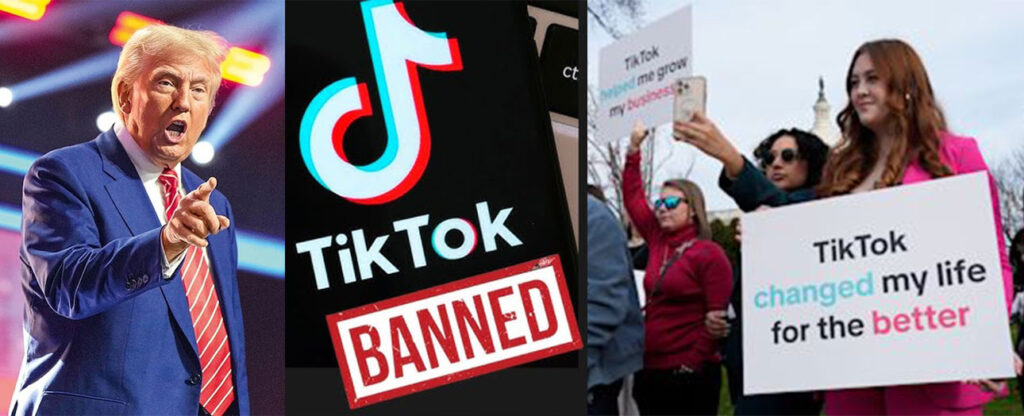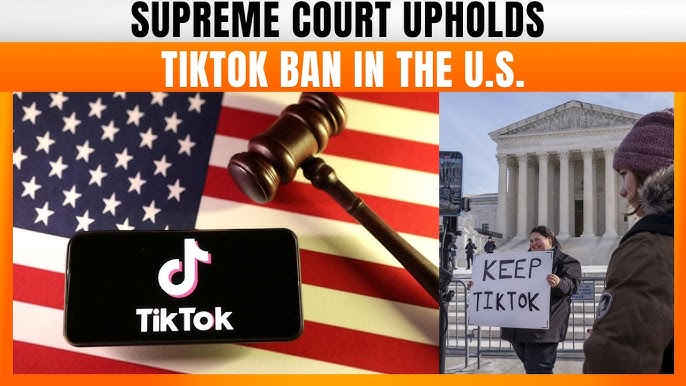TikTok Ban Update: Understanding the Reasons Behind the Controversy
Introduction
TikTok, the popular short-form video app, has faced increasing scrutiny and bans in various countries due to concerns over data privacy, national security, and content moderation. In the United States, the Supreme Court recently upheld a federal law banning TikTok unless its parent company, ByteDance, divests its ownership.

What Is TikTok and Its Global Popularity?
TikTok was launched by ByteDance, a Chinese tech company, in 2016. By combining AI-powered recommendations and user-friendly editing tools, it revolutionized how people create and consume content. From influencers to small businesses, TikTok became a hub for creativity and connection.
Why Is TikTok Often in Controversy?
Despite its popularity, TikTok has faced scrutiny over how it manages user data, the type of content on its platform, and its potential influence on younger audiences. These controversies have led to bans or restrictions in some parts of the world.
Reasons Behind TikTok Ban
Data Privacy Concerns:
- Lawmakers have alleged that ByteDance’s ties to China pose a national security risk if user data is shared with the Chinese government.
National Security Issues:
Under China’s 2017 National Intelligence Law, companies are required to cooperate with state intelligence work, raising fears that TikTok could be compelled to share user data with the Chinese government.
Content Moderation and Misinformation:
Concerns have been raised about TikTok’s ability to effectively moderate content, leading to the spread of misinformation and inappropriate material.
Data Privacy Concerns
One of the biggest criticisms of TikTok is its handling of user data. Governments and cybersecurity experts have raised alarms about the potential misuse of personal information. Allegations suggest that TikTok may share data with its parent company, ByteDance, and possibly with the Chinese government.
National Security Issues
Several nations, including the U.S. and India, have flagged TikTok as a national security threat. Concerns include the possibility of espionage, where TikTok could collect sensitive information from users and provide it to foreign entities.
Inappropriate Content and Misinformation
TikTok has struggled to moderate harmful content, including fake news, dangerous challenges, and inappropriate material. This lack of control has led to calls for stricter regulations or outright bans.
Parental Concerns and Youth Influence
With a large portion of its audience being teenagers, TikTok’s impact on mental health and behavior has raised eyebrows. Trends and challenges, while entertaining, can sometimes be harmful or risky, leading to injuries or promoting unhealthy behavior.

Global Status of TikTok Ban
United States: The Supreme Court upheld a law banning TikTok unless ByteDance sells the app to a U.S.-approved buyer.
Other Countries: Various nations have implemented bans or restrictions on TikTok due to similar concerns.
Countries That Have Banned TikTok
Countries like India have permanently banned TikTok, citing national security and privacy concerns. The U.S. has considered similar measures, especially under former President Donald Trump.
Partial Restrictions in Some Countries
In countries like Pakistan, TikTok has faced temporary bans for failing to moderate content. These restrictions are often lifted once the platform assures compliance with local regulations.
Response from TikTok
TikTok has stated that it will “go dark” in the U.S. unless it receives clarity from the government regarding its operations.
Impact of the Ban:
Users: Over 170 million American users face losing access to the app.
Influencers and Creators: Many content creators are preparing for the potential shutdown by exploring alternative platforms.
Efforts to Address Privacy Concerns
TikTok has announced plans to store user data locally in data centers outside China. For instance, they’ve set up operations in Ireland to reassure European users.
Engaging with Governments
TikTok actively engages with policymakers to address concerns and adhere to regional regulations. They’ve also published transparency reports to build trust.
Marketing and PR Strategies to Rebuild Trust
From hiring local teams to launching safety campaigns, TikTok has ramped up efforts to repair its reputation.
Impact of TikTok Ban
Effect on TikTok’s Revenue and Operations
The ban in key markets like India led to significant revenue losses for TikTok. It also forced the company to rethink its operational strategies.
Alternatives Gaining Popularity
Platforms like Instagram Reels and YouTube Shorts have gained traction, filling the void left by TikTok in banned regions.
Impact on Influencers and Creators
For many influencers, TikTok was their primary platform. After the ban, creators migrated to alternatives, often losing their audience or starting from scratch.
Future of TikTok
What’s Next for TikTok?
The future of TikTok in the U.S. remains uncertain. President-elect Donald Trump has suggested he may grant a 90-day reprieve, allowing more time for a potential sale or resolution.
TikTok’s future depends on its ability to address privacy concerns, comply with regulations, and regain trust. While it faces challenges, its innovative format and loyal user base suggest it could make a comeback.

Conclusion
The TikTok ban underscores the complex interplay between technology, national security, and user privacy. As the situation evolves, users and creators alike are left in limbo, awaiting definitive outcomes.
FAQs:
Why has TikTok been banned in the U.S.?
- Due to concerns over data privacy and national security, particularly related to its Chinese parent company, ByteDance.
What does the Supreme Court’s decision mean for TikTok users?
- Without a sale or government intervention, TikTok will become inaccessible to U.S. users.
Is there a possibility of TikTok remaining operational in the U.S.?
- Yes, if ByteDance sells TikTok to an approved buyer or if the government provides an extension or alternative solution.
How are content creators responding to the potential ban?
- Many are exploring alternative platforms to continue their content creation.
What are the broader implications of the TikTok ban?
- The ban highlights ongoing tensions between the U.S. and China and raises questions about the future of global technology companies operating across borders.
Note: In this Blog article we collect the information from below website:
You can read more articled here:


